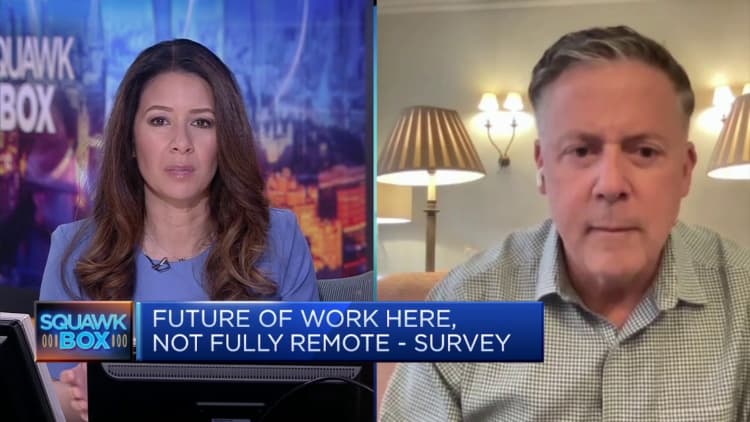Millennials and Gen Z, it may be time to reacquaint yourself with office attire and the daily commute: Your days of remote working could be numbered, according to one future of work author.
As the workforce adapts to a "post-pandemic" landscape, it could be in the interests of both employers and employees to return to the office full-time, Steve Cadigan, LinkedIn's first chief HR officer, has said.
Younger workers — those in Gen Z and the lower range of the millennial age bracket — looking to advance their careers could especially stand to gain from a return to pre-pandemic norms, according to Cadigan, whose book "Workquake" explores how the pandemic could could pave the way for a better workplace model.
"That 20 to 35, particularly the 20 to 29, 30-year-old age is really frustrated," Cadigan told CNBC.
"Their sense of commitment to an organization where they haven't met people in person, they haven't been around, is much less than the people who are spending time together as we were before," he said.
The challenge for that group is trying to be more intentional.Steve Cadiganauthor of "Workquake"
Remote work policies, implemented in the early days of the pandemic, have facilitated major steps forward, including increased workforce participation and still strong productivity levels, Cadigan said.
But they have also resulted in a disconnect between employees and their teams, fueling phenomena such as the Great Resignation. That, in turn, has led to greater fluidity in the labor market, which, while fine in good times, could be risky ahead of a potential recession.
To remedy that, younger workers may need to return to the workplace — whether voluntarily or otherwise —to nurture those all-important relationships with both teammates and superiors, he said.
"The challenge for that group is trying to be more intentional," Cadigan said.
"It's really, really hard to do that in a remote capacity, and that may be a big forcing function that's going to force organizations to realize we need to get this younger demographic together for them to feel more committed and for them to feel excited about being part of the team. It's a big challenge right now," he added.

While many workers have already been asked or have chosen to return to the office, the number of people working from an office full time is still well below pre-pandemic levels.
As of April 2022, two years on from the start of the pandemic, just over a third of workers (34%) had returned to the office full time, according to a study from Slack's research consortium Future Forum.
Even then, less than half were there of their own accord, with 55% of in-person office workers saying they would prefer a more flexible arrangement.
Indeed, the Netherlands moved a step closer toward making remote work a legal right this week.
The Dutch Parliament on Tuesday approved legislation that forces employers to consider employee requests to work from home if their professions allow it. The legislation, which was approved by the lower house, now needs approval from the Senate before its final adoption.
The Netherlands, which implemented the more limited Flexible Work Act in 2016, is one of a dozen European countries to introduce legislation for remote work, including France, Belgium and Estonia. Typically, such laws require agreement from both employer and employee.


